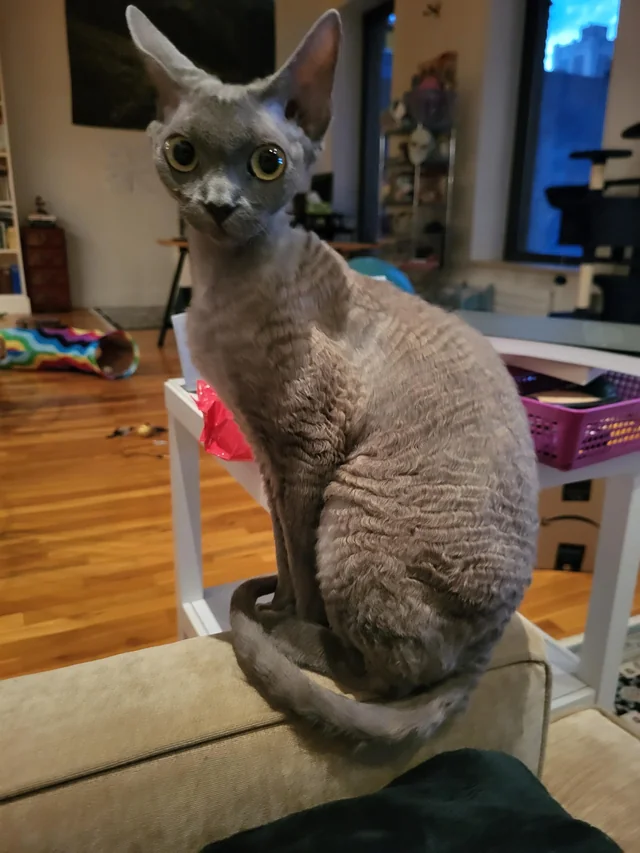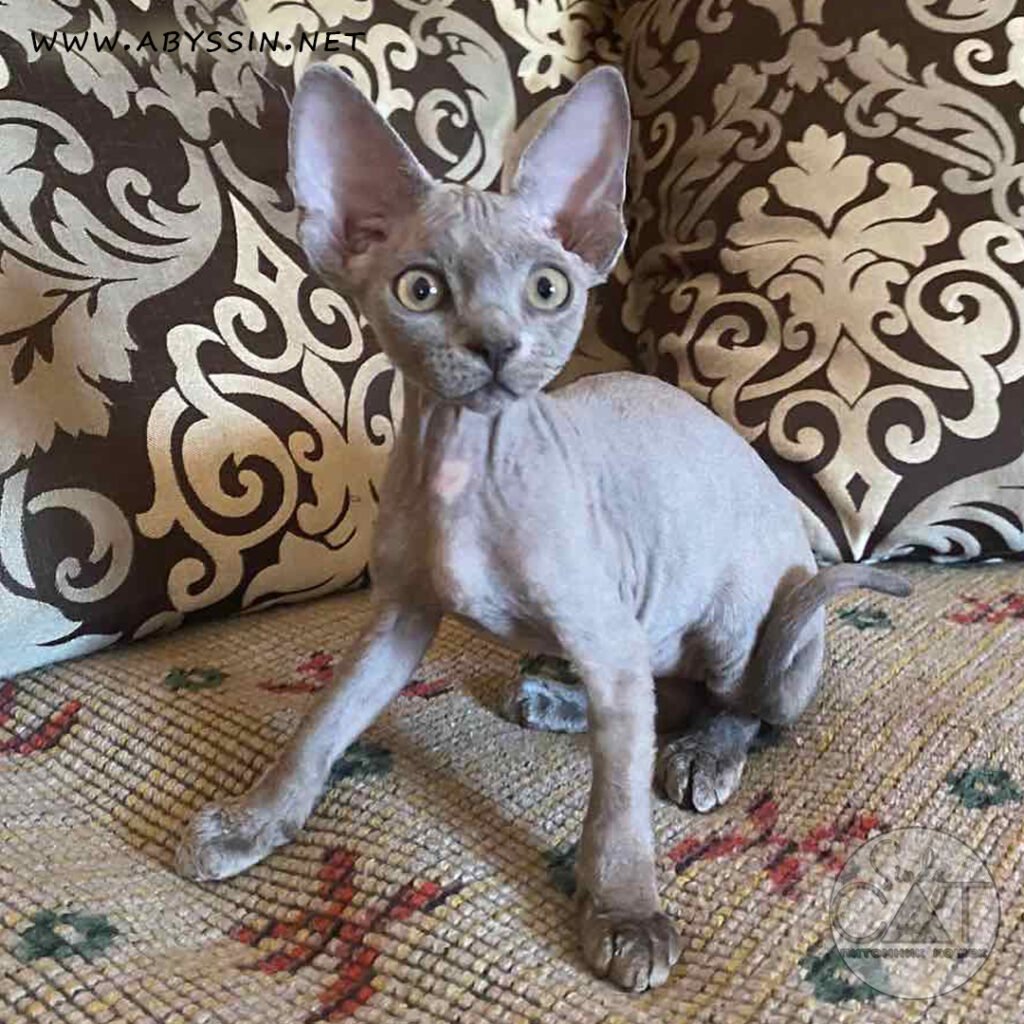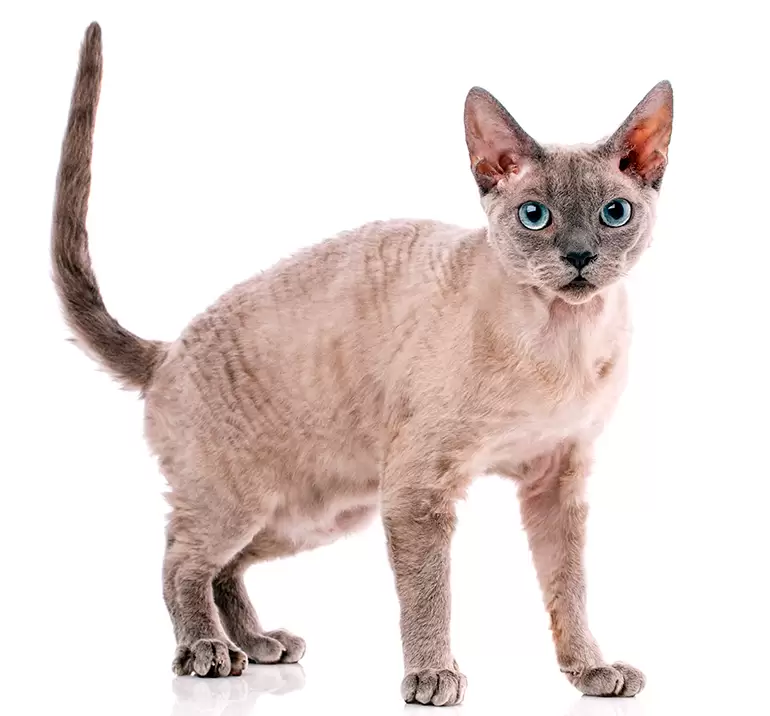Devon Rex
The Devon Rex is a distinctive breed of cat known for its unique physical attributes that set it apart from other feline breeds. One of the most defining features of the Devon Rex is its curly coat, which has a soft, velvety texture. This breed exhibits a variety of colors and patterns, including solid, tabby, tortoiseshell, and pointed variations. The coat requires minimal grooming compared to other breeds due to its short length and curliness, which limits the amount of shedding. Regular bathing is recommended to keep the coat clean and to prevent oil buildup on the skin.

In terms of size, the Devon Rex is considered a medium-sized breed. Adult cats typically weigh between 5 to 10 pounds and possess a slender, athletic build. Their body structure features a short, broad back and a deep chest, giving them a muscular appearance yet maintaining elegance. The breed’s legs are long and slender, allowing for agile movements, while the paws are small and oval in shape.
Another distinguishing characteristic of the Devon Rex is its remarkably large ears, which are wide at the base and taper to a point. These ears not only enhance the breed’s expressive appearance but also contribute to its exceptional hearing capabilities. Furthermore, the breed possesses high cheekbones and a short muzzle that contributes to its unique facial expression. Overall, these physical traits of the Devon Rex not only contribute to its breed profile but also play a role in its health and well-being. While they are generally healthy cats, special attention should be paid to ear hygiene and dental health due to their anatomical traits.

Personality
Intelligence is a hallmark of the Devon Rex. They are quick learners who enjoy mental stimulation, often engaging with toys that challenge their cognitive skills. This breed’s inquisitive spirit means they will investigate new sights and sounds within their environment meticulously. Their intelligence not only showcases their playful side but also highlights the importance of providing them with various enriching activities to keep them engaged.
When it comes to interaction with families, Devon Rex cats are known for their affectionate behavior, often forming strong bonds with both children and other pets. They typically exhibit a gentle demeanor around kids, making them a suitable addition to households with young ones. Moreover, their propensity for socializing means they adapt well to situations involving various species. However, it is crucial to introduce them to new pets gradually to ensure a harmonious coexistence.
Despite their energetic disposition, Devon Rex cats can possess a few quirks. They may engage in playful behaviors that can keep their families entertained for hours. To cater to their social needs, owners should considering spending quality time with them daily, providing opportunities for play and exploration. This breed’s unique blend of playfulness, intelligence, and affectionate nature indeed makes them a delightful addition to any home.
Origins
The Devon Rex cat breed has a rich and intriguing history that traces back to the 1960s in Devon, England. The journey of this unique breed began when a stray cat named Kirlee was discovered on a farm in 1960. Kirlee exhibited a distinct mutation characterized by its soft, curly coat and large ears, traits that set a precedent for the breed’s future development. Upon recognizing the genetic uniqueness of this cat, local breeders initiated focused breeding programs, aiming to enhance and stabilize these remarkable features.

The initial development of the Devon Rex involved the collaboration of several breeders who worked to refine the breed’s characteristics. One of the key figures in this venture was Beryl Cox, who became instrumental in the breed’s formal recognition. Through careful selection and breeding practices, Cox and her contemporaries were able to create a line of cats that not only preserved Kirlee’s captivating appearance but also expanded upon it, resulting in the distinctive physique that the Devon Rex is celebrated for today.
Although they share a common ancestry, the Devon Rex is often compared to the Cornish Rex due to their similar appearance, yet they are distinct breeds with unique genetic backgrounds. The Cornish Rex originated in Cornwall, England, about a decade earlier than the Devon Rex and differs primarily in its coat length and other physical traits. The Devon Rex’s unique genetic mutation is a result of a different form of recessive gene, leading to its trademark curly fur. This differentiation is essential for prospective owners and breeders to understand, as it influences the care, maintenance, and breeding practices surrounding both breeds. The Devon Rex quickly gained popularity, becoming a favored choice in cat shows across the globe, further solidifying its status as a recognized breed.
Care of the Devon Rex
The Devon Rex cat requires specific care and maintenance to thrive as a unique breed characterized by its playful nature and distinct physical appearance. Their dietary needs are paramount, and it is essential to provide a balanced diet that caters to their energy levels. High-quality commercial cat food that contains a mix of protein, fat, and essential nutrients is advisable to support their active lifestyle. Additionally, portion control is necessary to prevent obesity, which can lead to various health issues.
Exercise is another critical facet of maintaining a healthy Devon Rex. These cats are known for their playful demeanor and energetic behavior, so incorporating daily playtime is vital. Activities should focus on interactive play with feather toys, laser pointers, or even puzzle feeders that stimulate their mental acuity. Providing climbing structures and scratch posts can also help keep them physically active, enabling a healthier lifestyle while catering to their natural instincts.
Creating an engaging environment is vital for the well-being of a Devon Rex. Include various toys that stimulate their inquisitive nature, and regularly rotate these items to maintain engagement. Moreover, providing opportunities for socialization, both with humans and other pets, helps foster a well-rounded companion. In conclusion, adopting these care practices can significantly enhance the quality of life for a Devon Rex, ensuring they remain a happy and healthy member of the household.
Health
The Devon Rex is a playful and affectionate cat breed known for its curly coat and large ears. While generally healthy, they can be prone to hereditary myopathy, hip dysplasia, and skin conditions due to their delicate fur. A balanced diet, regular vet check-ups, and proper grooming help maintain their well-being. Learn more about Devon Rex cat health, common diseases, and care tips to keep your feline happy and thriving!
Nutrition
The Devon Rex cat requires a high-protein, nutrient-rich diet to support its fast metabolism and active lifestyle. Choose quality wet or dry cat food with real meat as the primary ingredient. Avoid fillers like corn or soy, and supplement with omega fatty acids for skin and coat health. Fresh water and portion control are key to maintaining a healthy weight. Consult your vet for personalized nutrition advice.
Cleanliness
The Devon Rex is a low-maintenance cat breed known for its short, wavy coat that sheds minimally. While they produce less dander than other breeds, regular grooming is essential to prevent oil buildup on their skin. These cats require occasional baths and ear cleaning due to their active sebaceous glands. Their fine fur makes them prone to feeling cold, so they thrive in warm environments. Perfect for allergy sufferers, the Devon Rex combines playful energy with easy-care cleanliness.
Best cat breeds for kids
The Devon Rex is one of the best cat breeds for kids, known for its playful, affectionate, and social nature. With its large ears, curly coat, and energetic personality, this cat loves to interact and entertain children. The Devon Rex is highly intelligent and enjoys learning tricks, making it a fun and engaging family pet. Plus, its low-shedding coat makes it a great choice for families with mild allergies.
People who have seen this breed have also visited…
In this section you can find completely detailed information about the breed of your cat.
